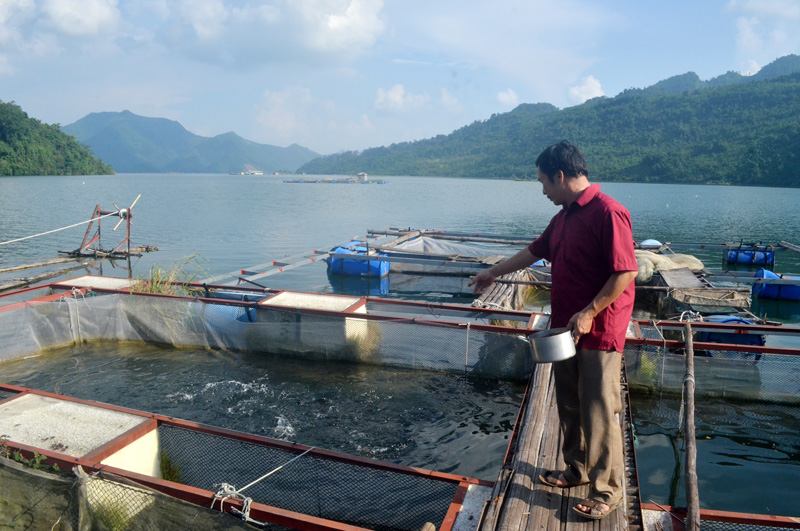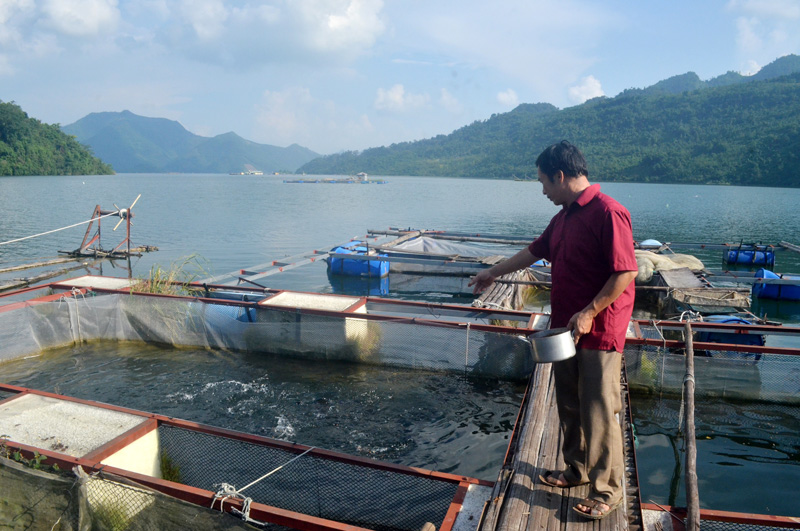
(HBO) – Hoa Binh reservoir has a total water surface area of 16,800 ha spanning the northern mountainous provinces of Hoa Binh and Son La, of which 8,892 ha belong to Hoa Binh. The vast, clean and nutritious reservoir is favourable for caged fish farming, with many rare and high-value varieties.

Residents in Hien Luong commune,
Da Bac district, have invested in caged fish farming, which brings in high
economic value.
Among the
five rivers running through Hoa Binh province, the Da River is the longest with
151km. The Hoa Binh reservoir has a total water surface area of 16,800 ha, with
8,892ha in 19 communes of Hoa Binh province.
Surrounded
by hills and mountains, the deep reservoir is rich in aquatic resources. Apart
from ephemera, there are thousands of vegetation covers, along with protective
forests that provide organic elements for the lake.
Besides,
Hoa Binh province is home to hundreds of irrigation reservoirs favourable for caged
fishing farming, along with rivers and lakes with a total area of 14,560ha.
In fact,
caged fish breeding began in Hoa Binh a long time ago but it saw a boom in the
1990s when the water level of the Hoa Binh reservoir got stable. According to
statistics, before 2013, the province had about 1,250 fish cages. Between 2013
and now, the number has increased continuously. At the end of 2017, the number
of fish cages stood at 4,050, equivalent to 220,000 sq.m, with an accumulated
output of 7,700 tonnes of fish, generating jobs for over 5,000 labourers.
Not only
households residing around the reservoir but many individuals and organizations
both in and outside the province have participated in fish farming. Up to 35
businesses, cooperatives and farm owners in the province have invested in caged
fish breeding in the reservoir. Many firms have expanded their investment such
as Da River Clean Fish JSC which has provided 35 tonnes of fish for the Hanoi
market monthly, Hai Dang Seafood JSC with 30-40 tonnes, and Viet Duc Seafood
Co., Ltd which has injected over 70 billion VND in raising sturgeon in cages.
These
firms said that they have earned profits from breeding fish in cages in the
reservoir, saying they get about 30-40 percent of profits earned from each
cage. Therefore, many businesses have expanded their production.
By the
end of 2017, the province’s aquaculture area was 2,680 ha with 4,000 fish cages,
providing about 7,200 tonnes of fish. According to the centre of plant, animal
and seafood varieties, localities aim to turn fish cages into centralized fish
farms with large scale and high economic value, thus creating a new momentum in
the province’s aquaculture development strategy.
According to data from the Hoa Binh Provincial Party Committee, the industrial production index for the first six months of 2025 is estimated to have increased by 20% compared to the same period last year. This marks the highest year-on-year growth rate for this period since 2020.
In the first six months of 2025, Hoa Binh province’s export turnover was estimated at 1.145 billion USD, marking an 18.11% increase compared to the same period in 2024. Import turnover was estimated at $ 804 million, a 17.15% increase, which helped the province maintain a positive trade balance.
The lives of the ethnic minority farmers in Tan Lac district have gradually improved thanks to the new directions in agricultural production. This is a testament to the collective strength fostered through the professional associations and groups implemented by various levels of the district’s Farmers’ Union.
With the motto the "product quality comes first,” after nearly one year of establishment and operation, Muong village’s Clean Food Agricultural and Commercial Cooperative, located in Cau Hamlet, Hung Son Commune (Kim Boi district), has launched reputable, high-quality agricultural products to the market that are well-received by consumers. The products such as Muong village’s pork sausage, salt-cured chicken, and salt-cured pork hocks have gradually carved out a place in the market and they are on the path to obtaining the OCOP certification.
In the past, the phrase "bumper harvest, rock-bottom prices" was a familiar refrain for Vietnamese farmers engaged in fragmented, small-scale agriculture. But today, a new spirit is emerging across rural areas of Hoa Binh province - one of collaboration, organisation, and collective economic models that provide a stable foundation for production.
Maintaining growing area codes and packing facility codes in accordance with regulations is a mandatory requirement for agricultural products to be eligible for export. Recently, the Department of Agriculture and Environment of Hoa Binh province has intensified technical supervision of designated farming areas and packing facilities to safeguard the "green passport" that enables its products to access international markets.



